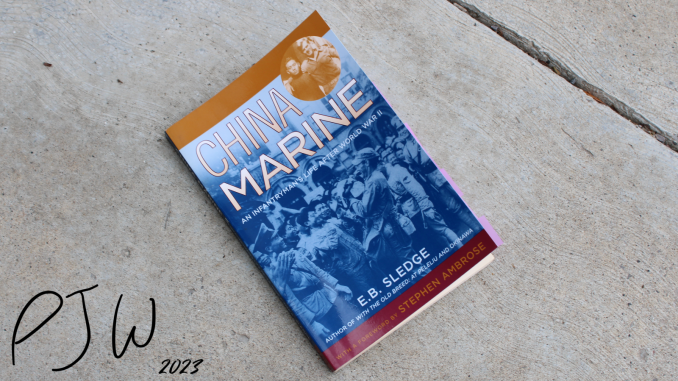
Eugene Sledge’s first book, With the Old Breed ends abruptly, after the Japanese surrendered in Summer of 1945. This was a choice done by his editor, however, Sledge’s time in the Marine Corps lasted another 6 months, and involved a tour of duty in North China. China Marine is Sledge’s account of his time on Okinawa after the Japanese surrender, then his stint in China, and his return back to the USA. How does China Marine fare after reading With the Old Breed?
The End of Agony
I would highly recommend reading my review of Eugene Sledge’s With the Old Breed prior to continuing. China Marine is a continuation of Sledge’s memoirs from Old Breed, and very much read as such.
The final chapter in Old Breed is titled “The End of Agony”. It surmises the final fighting on Okinawa, and the duties that Sledge and K/3/5 had from June of 1945 till the Japanese surrender in August and September. Sledge and his comrades had been prepping to invade the Japanese Home Islands prior to the declaration of surrender, and China Marine begins right before the declaration. Sledge and K/3/5 were doing duties on Okinawa, such as clearing land, killing snakes, and trying to recoup after the harsh fighting. However, they are soon packed onto ships, and taken for duty in North China.
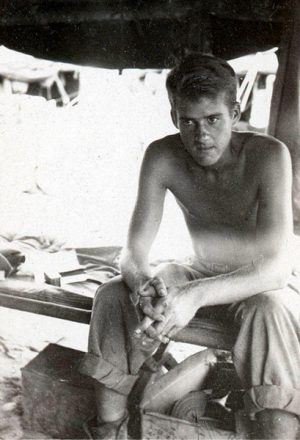
“The End of Agony” is an apt chapter title, as it was the end of the Marine’s fight on Okinawa against the tough Japanese troops. However, the title also encompasses Sledge’s transition into trying to recover from the horrors of the war. While his time in China was far from a holiday, it was a period of much recovery.
Becoming a China Marine
By early October of 1945, K/3/5 was sent to North China. The title of the book came from Sledge hearing a marine state “We’re China Marines now!”. The various companies of 1st Marine Division 3/5 were dispersed through China, and K/3/5 ended up in Peiping. K/3/5 was to man a post, and had two primary jobs. The first was to assist in repatriating Japanese people back to Japan. The second was to stand guard, and to assist the Nationalist Chinese faction against the Communists. The Marines were not to engage in open combat, but were there to back up the Nationalists if needed.
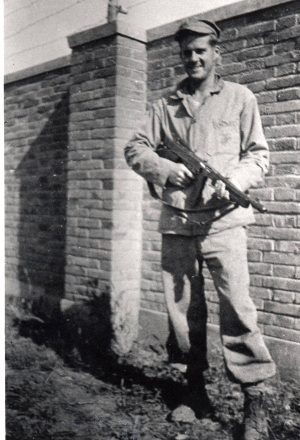
China was much different than the South Pacific and Okinawa. It was Fall, then Winter, and was much, much colder. Sledge stated that the Chinese were elated to see US Marines, and would thank them at nearly every opportunity for defeating the Japanese. During this period of time, Sledge began to respect the Chinese greatly. He viewed them as ragged people who would work impossibly hard just to put food on the table.
K/3/5 was put up in an old English fort, but would occasionally pull guard duty at nearby installations. Sledge pulled overnight guard duty at an old airfield, and marveled at the stripped Japanese aircraft there. His time spent there was cold, windy, and frightening. Nationalist Chinese troops would fire artillery at communists, with the flight of the rounds being directly overhead of the airfield. Between that, and the former Japanese guard dogs that roamed the airfield at night, it was tense. However, around this time, Sledge would find some new friends.
Multinational Friends
K/3/5 was assigned a houseboy, Hao Ching Fu. Hao was a cook, a shoe shiner, and one of Eugene’s best friends in China. Hao helped Eugene learn Mandarin, while Eugene taught him English. Sledge wanted to learn about China and Chinese culture, and Hao assisted greatly. The marines joked that Sledge had taught the houseboy to speak English with an Alabama accent, which is extremely humorous to read.
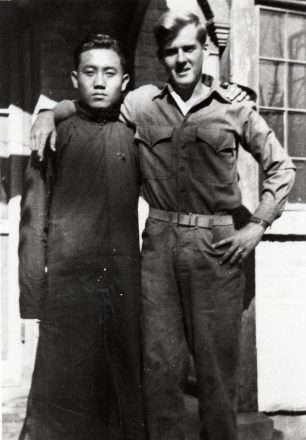
With learning Mandarin, this allowed Sledge to converse with many of the Chinese folk on the streets of Peiping. Rickshaw coolies were often seen, pulling handcarts with people in them. Sledge would befriend them, and so many would be smitten by a US Marine that knew a fair bit of Mandarin.
Around the late Fall of 1945, Sledge would befriend a Chinese family, and a Belgian Flemish priest. Father Marcel was a Belgian that had been interred by the Japanese in China, and during that time, had gotten extremely physically fit. He was college friends with Dr. Y.K. Soong, a Chinese medical doctor that was fluent in Mandarin and French. Dr. Soong had a pretty wife, Margaret, and Margaret’s sister, Anna, lived with them too. Sledge’s father was a physician, so Sledge felt like he had a second home with the Soong’s in Peiping. Sledge would spend much of his liberty time with the Soong’s and Father Marcel, and spent the holidays with them too. They were his “bridge back to civilization after months of killing“.
Spectacles In China
A lot of Sledge’s time in China was spent doing tedious guard duty. However, Sledge would get up to fun on his liberty time. Aside from visiting his surrogate family, he would sightsee often.
Sledge spent much time visiting the Forbidden City. The Forbidden City was an ancient historic city, talked about by Marco Polo in his travels. He would spend much free time here, taking in the architecture, and artwork. Sledge was deeply fascinated by Chinese history, and would try and learn about it at every possible crossroads.
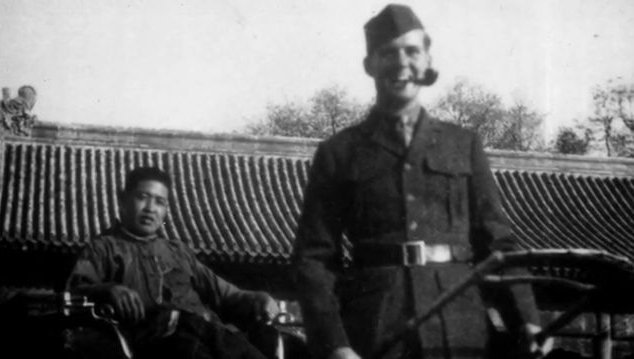
Sledge and the other marines also found how easy it was to play pranks on the Chinese. He talks about how easy it was to gather a crowd on the street, even when nothing was happening. Sledge and fellow marines would all look at the sky, as if looking at something. Chinese people would gather to see what they saw, and soon, a crowd would emerge. This sounds like a way to break some serious boredom, but it paints a funny picture. A crowd gathered, all looking up in the sky, just to ponder nothing.
Many marines partook in drinking and sleeping with prostitutes, but Sledge never did that. He didn’t want a venereal disease, and was not one that would be getting drunk. Sledge saw many friends contract VDs, or be tossed in the brig for drinking too much.
Leaving China
In February of 1946, Sledge would be leaving China, and heading back to the States. He bid farewell to Hao Ching Fu and the Soong’s, and stated that he would maintain correspondence with Father Marcel. After Sledge left China, he never heard from the Soong’s again. Sledge maintained contact with Father Marcel until his death in the late 1940s. Father Marcel also lost contact with the Soong’s, and their fate is thought to have not been great as the Communists took over China.
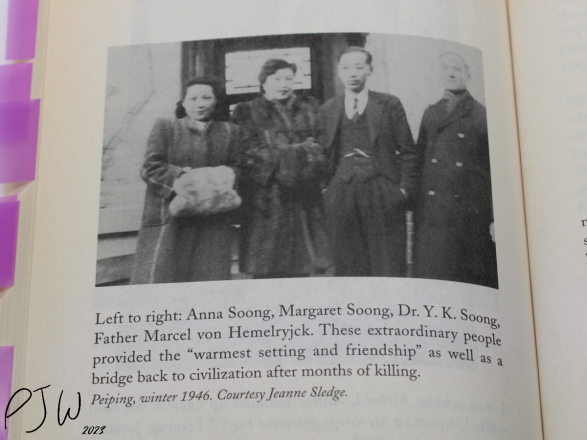
Returning stateside, Sledge would struggle with coming home. He was happy to be with his family again, but he found it difficult to return to an “easy” life. He found himself disgruntled at rear-echelon and non-combat veterans, but tried to acclimate to his post-war life. Eugene would return to education, but had a hard time at first. A found himself at odds with an admissions worker, and had the following confrontation:
“Didn’t the Marine Corps teach you anything?!” She said, in an exasperated voice.
I said in a loud, calm voice: “Lady, there was a killing war. The Marine Corps taught me how to kill Japs and try to survive. Now, if that don’t fit into any academic course, I’m sorry. But some of us had to do the killing – and most of my buddies got killed or wounded.”
Returning to civilian life was hard, but Sledge did so. Sledge recounts that one of his pre-war hobbies was hunting, but he could no longer hurt animals. His father recommended that he watch birds, rather than shoot them, which lead to his education in biology. He would get married, and would eventually become a Ph.D. of Biology, and would teach at the University of Montevallo.
Why China Marine is So Good
Sledge is an eloquent wordsmith, and both books show this. These memoirs give us a look into his experiences, and his life. Sledge died over 20 years ago, but in reading this, I feel like I know the man like an old friend. China Marine is an extremely personal experience, and allows us to get into Sledgehammer’s shoes.
One of the things that strikes me is how respectful Sledge is. He wants to learn about Chinese culture, and to know their people. He is often sent out on duties because he was the only Marine in K/3/5 who put in effort to learn Mandarin, even to a rudimentary level. Sledge finds himself with a new family that he can learn, and grow with. When he leaves China, he sheds tears with them.
Another interesting point is how blunt Sledge is. While on guard duty at the airfield, he nearly has to shoot a former Japanese guard dog. He talks how he hesitated in shooting it, but he never hesitated for killing men. He had killed countless soldiers, but this beautiful German shepherd caused hesitation. This also comes up again when Eugene realizes that he cannot hunt animals anymore, as they are creatures not deserving of it.
The book ends with Sledge talking about his feelings on the war. After decades of nightmares, he has found ways to mitigate the terror, but that he is forever changed. Sledge states that he cannot “mellow” to the war. For him, to forgive was to forget the atrocities that the Japanese perpetuated. He states that he is proud of the enemies that he killed, and regrets the ones that he missed. It takes a brutally honest man to admit this.
The Verdict
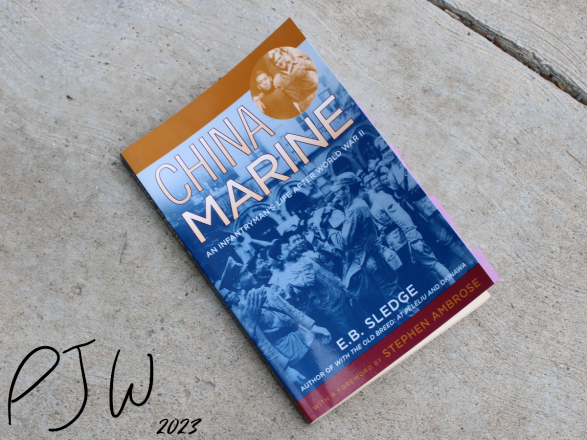
China Marine is excellent. It is as good as Sledge’s prior book, and I can wholeheartedly recommend it. I’d like to share some passages that I found profound.
Quotes From China Marine
On the Chinese public – “In China, it seemed one worked hard – or starved.”
On hesitation to shoot a dog – “How strange it was, I thought, that I had killed men who were a threat to me, but it was unthinkable to kill this splendid dog – who was also a threat to me.”
Listening to Mozart with Dr. Soong’s family and Father Marcel – “It was the warmest setting and friendship I’ve ever known, Mozart speaking to six dear friends of three nationalities – Chinese, Belgian, and American.”
“In looking back, I am still amazed I escaped the killing machine. Why I never fell killed or wounded in that storm of steel thrown at us countless times still astonishes me. I am proud of the number of the enemy I fired on and hit with my mortar, rifle, or Tommy gun – and regret the ones I missed. There is no “mellowing” for me – that would be to forgive all the atrocities the Japanese committed against millions of Asians and thousands of Americans. To “mellow” is to forget.”
“Socrates said, ‘Know Thyself’. I do. The war taught me.”
Book Recommendations
If you enjoy reading about the Asia-Pacific war, check out the following previously reviewed books:




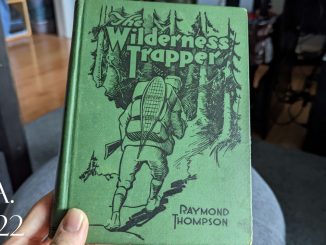
1 Trackback / Pingback